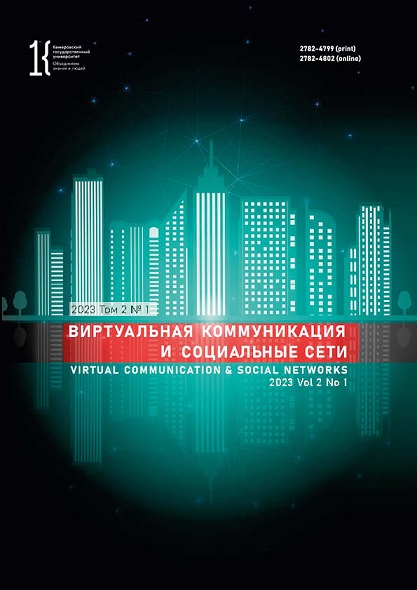Yelets, Russian Federation
Yelets, Russian Federation
The present research was based on the following assumption: under social restrictions of the COVID-19 pandemic, the involvement of teenagers in the virtual environment depended on the degree of restriction of their natural social interaction, which was significantly greater in Moscow than in Lipetsk. The experiment involved 146 middle school students of 8–9 grades from the industrial city of Lipetsk (96) and Moscow (50). The respondents answered V. G. Kamenskaya’s questionnaire of Digital Preferences of Modern Teenagers, pretested on a sample of Moscow schoolchildren. The minimal and average time of using gadgets for social networks and online games was very similar in both groups. However, a significantly larger number of Moscow teenagers spent four hours of their free time on online games and virtual communication, which can be considered as a relatively high risk of Internet addiction. A significantly higher percentage of Lipetsk students maintained several social net accounts and blogs, which means a relatively high competence of virtual communication. In general, the high activity of schoolchildren in the virtual communication space manifested itself as a specific form of psychological protection against the restriction of real-time social commination during the pandemic.
adolescents, capital, industrial city, COVID-19 pandemic, social media, distinct behavior in virtual space
1. Kamenskaya V. G., Tomanov L. V., Tatyanina E. V. Children and adolescents of the digital world. Family and Society: Psychological and Socio-Pedagogical Aspects of Deviant Behavior Prevention: Proc. Interregion. Sci.-Prac. Conf. with the Intern. participation, Lipetsk, 27 Oct 2020. Lipetsk: Otkrytyi mir, 2020, 40-46. (In Russ.)
2. Soldatova G. U., Teslavskaia O. I. Videogames, academic performance and attention problems: practices and results of foreign empirical studies of children and adolescents. Journal of Modern Foreign Psychology, 2017, 6(4): 21-28. (In Russ.) https://doi.org/https://doi.org/10.17759/jmfp.2017060402
3. Rudenkin D. V., Rudenkina A. I. Internet in social reality of contemporary Russian youth: trends and risks. Juvenis Scientia, 2019, (1): 43-48. (In Russ.) https://doi.org/10.32415/jscientia.2019.01.10
4. Cheng C., Cheung M. W.-L., Wang H. Y. Multinational comparison of internet gaming disorder and psychosocial problems versus well-being: meta-analysis of 20 countries. Computers in Human Behavior, 2018, (88): 153-167. https://doi.org/10.1016/j.chb.2018.06.033
5. Cerutti R., Presaghi F., Spensieri V., Valastro C., Guidetti V. The potential impact of internet and mobile ue on headache and other somatic symptoms in adolescence. A population-based cross-sectional study. Headache, 2016, 56(7): 1161-1170. https://doi.org/10.1111/head.12840
6. Cudo A., Kopiś N., Zabielska-Mendyk E. Personal distress as a mediator between selfesteem, self-efficacy, loneliness and problematic video gaming in female and male emerging adult gamers. PLoS One, 2019, 14(12). https://doi.org/https://doi.org/10.1371/journal.pone.0226213
7. Gottschalk F. Impacts of technology use on children: exploring literature on the brain, cognition and well-being. Organisation for Economic Co-operation and Development Education Working Papers, 2019, (195): 2-45.
8. Groarke J., Berry E., Graham-Wisener L., McKenna-Plumley P., McGlinchey E., Armour C. Loneliness in the UK during the COVID-19 pandemic: Cross-sectional results from the COVID-19 Psychological Wellbeing Study. PLoS One, 2020, 15(9). https://doi.org/10.1371/journal.pone.0239698
9. Kuss D., Lopez-Fernandez O. Internet addiction and problem at Internet use: A systematic review of clinical research. World J Psychiatry, 2016, 6(1): 143-176. https://doi.org/https://doi.org/10.5498/wjp.v6.i1.143
10. Luchetti M., Lee J., Aschwanden D., Sesker A., Strickhouser J., Terracciano A., Sutin A. The trajectory of loneliness in response to COVID-19. American Psychologist, 2020, 75(7): 897-908. http://doi.org/10.1037/amp0000690
11. Park S. K., Kim J. Y., Cho C. B. Prevalence of Internet addiction and correlations with family factors among South Korean adolescents. Adolescence, 2008, 43(172): 895-909.
12. Zhu S., Zhuang Y., Lee P., Li J., Wong P. Leisure and problem gaming behaviour among children and adolescents during school closures caused by COVID-19 in Hong Kong: A school-based quantitative. JMIR Serious Games, 2021, 9(2). https://doi.org/10.2196/preprints.26808















